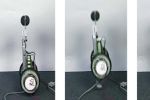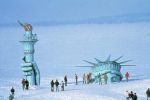In Case of Emergency, Breakdown
The pandemic has hit. The flu has infected millions of people, civilization is on the brink of collapse and there’s only so much vaccine to go around. The plan calls for saving the most vital members of society, the ones who can help save us from the plague. The plan says vaccinate doctors. The plan is wrong.
According to a new study entitled "Ethics and Severe Pandemic Influenza: Maintaining Essential Functions through a Fair and Considered Response", existing plans focus too narrowly on vaccinating medical staff and first responders to the exclusion of the garbage men, mechanics and janitors that actually keep society functioning.
“There are certainly a lot of plans that speak only of health care professionals and traditional first responders and really don't think of all the other people who allow the doctors and first responders to get their jobs done,” said Dr. Nancy Kass, Deputy Director of Public Health for the Johns Hopkins Berman Institute of Bioethics and lead author on the paper, “maybe we would do better to get some truck drivers get the vaccine before the 500th healthcare worker gets medication.”
The paper goes details two levels of societal breakdown that are not addressed by current planning. The first level is the support staff for medical personnel. Without a functional boiler to heat a hospital or deliveries of fresh medicine, healthcare work would grind to a halt. That makes supplying medication to the engineers that keep the boiler running and the truck drivers that supply hospital with medicine as important as helping the doctors treating the sick.
The second level addressed by the paper is the people who keep institutions at large working. To prevent the damage caused by pandemic flu from rippling across society, sewage engineers, garbage men and the other civic workers who maintain the country’s infrastructure also need protection from the flu.
“I think we certainly have identified groups of essential workers somewhat narrowly,” said Dr. Stephen Morse, a senior researcher at the National Center for Disaster Preparedness who was not a part of the study, adding “the Government plan does not explicitly get into this at this point.”
As far as recommendations go, the paper emphasizes government communication with people and personal responsibility. Kass suggests that families and business that can afford to should stock up on batteries, non-perishable food and water. The paper posits that a concerted community effort of preparedness would relieve pressure on the system during a time of crisis, freeing up government resources to help the least fortunate and sickest citizens. Unfortunately, not many people seem to be taking those steps.
“Not enough people are doing this,” said Kass, “I'll still give talks at places and I'll ask ‘how many of you have stuff stored in your basement?’ and it's generally no one."
To some, exhortations by the government to store up canned food evokes memories of fallout shelters in the backyard, but according to both Kass and Morse, the potential damage caused by a flu pandemic matches the Strangelove-ian disaster of that earlier panic. By the government’s own projections, a mild pandemic would involve 90 million people getting sick, more than 800,000 hospitalizations and over 200,000 deaths. Sickness would result in breakdowns of the supply chain, lowering the availability of food, batteries and other necessities.
While no plan may be able to stop a calamity of that scale, the improved plan proposed by the new paper might prevent the direst consequences. And the sooner communities begin enacting the recommendations of Kass and her coauthors, the less severe the pandemic outbreak will be.
“Each jurisdiction needs to figure out what they can do without,” said Kass I want them to realize that there are a lot of people who may remain hidden in a system but make the system work.”

Featured
SciTech
Science Confirms the Obvious 2008
The findings may be no-brainers (yes, you do get sick in winter), but these studies uncover hidden truths in conventional wisdomBuilding the Real Iron Man
While audiences flood theaters this month to see the comic-book-inspired Iron Man, a real-life mad genius toils in a secret mountain lab to make the mechanical superhuman more than just a fantasy with the XOS Exoskeleton
Popular on Popsci
Most Viewed
SciTech
- I Want That On My Desk By Two Million Years Ago
- A Million Plastic Balls to Halt Carcinogens
- Video: Why Artificial Intelligence Threatens Actual Intelligence
- A Little Off the Top, S'Il Vous Plait
- Killer Peppers
- More Bad News About Plastics
- And the Ig Nobel Goes to . . .
- And the Ig Nobel Goes To . . .
- Does Science Obviate Religion?
- Can I Have My SSN Back?
Most Commented
SciTech
- Does Science Obviate Religion?
- An Issue of National Security: Obama and McCain on DARPA
- Watch Your Wallet: Phishers on the Prowl
- Wriggling Away From Cancer
- Making Skin for Robots
- Let the Record Speak: Obama and McCain Tackle Science Education
- The Science of Spinning
- Human Evolution is Coming to a Standstill
- In Case of Emergency, Breakdown
- Rent a Robotic Suit Named HAL
Most Emailed
SciTech
- Human Evolution is Coming to a Standstill
- One in Four Mammals May Soon Be Extinct
- Killer Peppers
- An Issue of National Security: Obama and McCain on DARPA
- Watch Your Wallet: Phishers on the Prowl
- Wriggling Away From Cancer
- Making Skin for Robots
- Let the Record Speak: Obama and McCain Tackle Science Education
- The Science of Spinning
- In Case of Emergency, Breakdown








